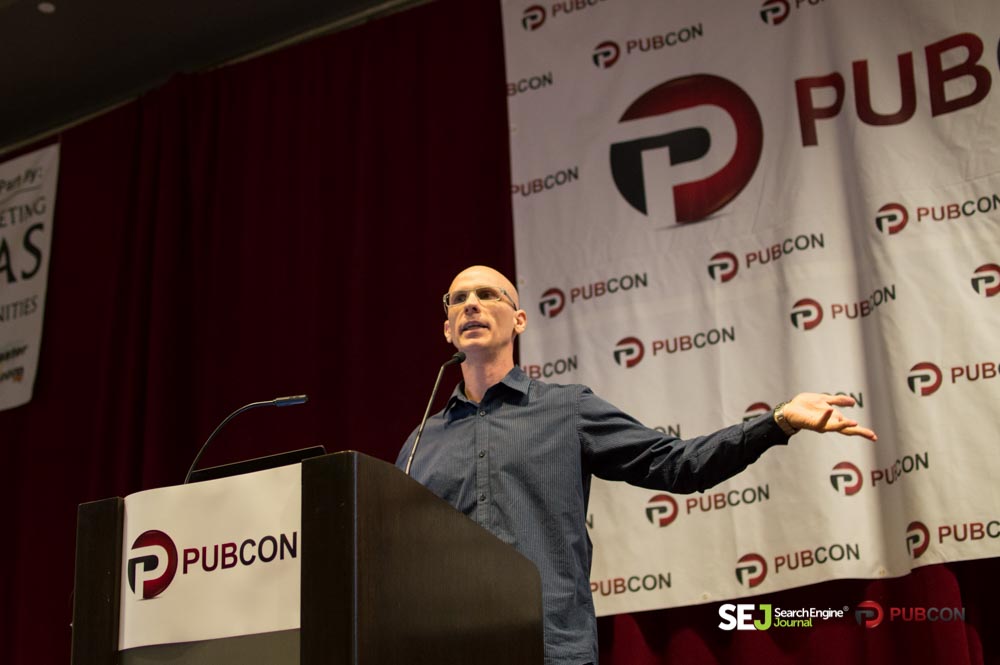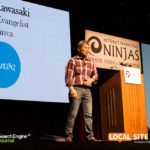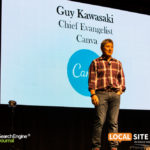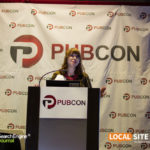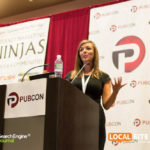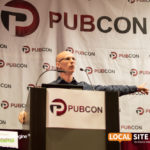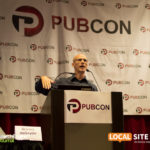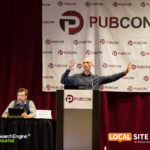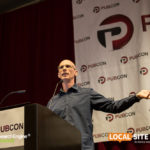Pubcon Founder, Brett Tabke, welcomes everyone on the first page of the official guide proclaiming this is the convention where marketers either adapt or die.
“Eat or be eaten. Move or be bulldozed. Learn what you need to know or become obsolete,” Tabke states.
Coming out of the first day of Pubcon I feel like it’s safe to say we’re that much further away from obsolescence.
Do you currently think of Pinterest as a search engine? Do you know how to market your content on Reddit without getting banned? Have any bulletproof strategies for acquiring .Edu links?
If you answered “no” to any of those questions, then you should have been there today. However, I will do my best to recap the most forward-thinking strategies coming out of Pubcon Day 1.
Morning Keynote: Guy Kawasaki
Industry veteran Guy Kawasaki got the day started with a crash course on personal branding 101. Marketing is a superficial world full of snap judgments, Kawasaki explained, comparing how the industry has evolved from a eHarmony-like environment to one more like Tinder.
In the time it takes to swipe left or right on Tinder, potential clients and customers are making similar judgments about you. Optimizing your online presence is key to surviving those critical first impressions.
Everything matters — from how your profile picture is lit, to the content of your last 5 tweets. In addition, Kawasaki also asks marketers to take a more serious look at Pinterest.
According to Kawasaki, the amount of “how to” searches conducted on Pinterest is rapidly increasing. For some, Pinterest may be the first thing they think of when trying to find out how to do things like make recipes. Marketers should start thinking of Pinterest as another type of search engine.
The key takeaway from this keynote is “perspective” — becoming more aware of the perspectives we create online can improve our business relations with others.
Afternoon Sessions – Pubcon Day 1
.Edu Links
One of the most successful strategies for acquiring .edu links, as explained by Jabez Lebret of Get Noticed Get Found, is scholarship campaigns.
Sponsoring a college or university sponsorship will certainly end up in a .edu link — but its not as easy as that, and apparently a lot of SEOs are going about it the wrong way.
Outreach is paramount, and this is where you have to get used to using the phone again. There’s no better way to get the ball rolling on this strategy than calling up a local university and asking how to get involved in sponsorships.
For best results, Lebret suggests offering a scholarship in the $2500+ range, saying that scholarships below that amount often don’t attract much interest.
Marketing on Reddit Without Getting Banned
To effectively market yourself on Reddit you have to become a Redditor, as SEJ’s Brent Csutoras explained when laying out his playbook for Reddit marketing.
Reddit users and mods can sniff out an outsider from a mile away. If you’re just there for marketing purposes, and make no attempt to engage with the community, that’s one-way ticket to bansville.
If you’re only posting links and not engaging with any other submissions, you’re spamming Reddit, Csutoras says. Becoming a frequent commenter is a way to show you’re community-minded.
In addition, it’s also important to share others’ content, not just your own. Selecting the right subreddits to join, and getting to know what the mods like and dislike, is also key to creating successful submissions on Reddit.
You can’t approach Reddit like marketing on other social networks, put some time in to get a feel for Reddit and what makes it tick.
Without question, Reddit is one of the toughest marketing avenues to master, but that goes to show how relevant it’s going to be for a long time.
Bleeding Edge Keyword Research Tactics
Use Paid Search to Guide Organic Strategies
The keyword research tools provided by Google all have their limitations. Search Console and Analytics are limited by no performance data — and Search Console only provides data for the past 90 days.
Solution? Craig Paddock of Plaza Digital suggests to use paid search data to guide organic search campaigns. AdWords’ Organic Report can help you find valuable data like click-through rates on keywords.
Further, spending on paid search will help you rank organically, Paddock says. According to a 2 million dollar study conducted by his company, spending aggressively on paid search does lead to organic rankings.
Paid search puts eyes on your content, which will then lead to people sharing and linking to your content. Those are the kinds of organic signals generated from paid search that lead to rankings.
Logarithmic Keyword Research
Ash Nallawalla touched on a subject that has been covered in detail by Eric Enge, called Term Frequency (TF). TF refers to how frequently a term appears in a document. This concept is also referred to lateral keyword research.
By analyzing how frequently key terms appear on your piece of content, versus high ranking content from competitors, you can start to see opportunities your competitors are taking advantage of which you may have missed.
There’s a complicated formula and accompanying spreadsheet to go with this research method, but an even simpler option has recently been launched at LateralKeywords.com. It’s in open beta right know, and I for one can’t wait to try it out on my next keyword research task.
Valuable Keywords for 2015
It wouldn’t be a day at Pubcon without hearing Bruce Clay speak, and he dropped the usual wealth of knowledge convention goers come to expect.
Here’s a run down of some of the largest trends in search volume observed so far this year:
- Searches for “wholesale” are up 50% in year over year search volume
- Searches for “nearby” are up 11% in year over year search volume
- Searches for “how to” videos on YouTube are up 70% in year over year search volume
Clay is also quick to point out that search volume alone isn’t everything, you also need to be aware of search intent. One of the best ways to discover what people are actually typing into Google is to go by the suggestions in Google Instant.
As Clay explains, Keyword Planner isn’t as adept at returning information about search intent, but it is a good starting point for further research.
No matter what type of content you create, make sure it’s in line with the subject matter you’re an authority on. Clay says a Panda penalty could result from publishing content that strays too far outside your field.
Please see below for a full photo gallery from Pubcon Day 1.

